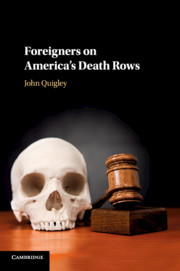Description
Foreigners on America's Death Rows
Author: Quigley John
Investigates how foreigners charged with capital murder in the United States are deprived of rights by police and courts.
Language: English
Approximative price 26.37 €
In Print (Delivery period: 14 days).
Add to cart
Foreigners on America's Death Rows
Publication date: 08-2019
Support: Print on demand
Publication date: 08-2019
Support: Print on demand
Approximative price 120.27 €
In Print (Delivery period: 14 days).
Add to cart
Foreigners on America's Death Rows
Publication date: 05-2018
300 p. · 15.5x23.5 cm · Hardback
Publication date: 05-2018
300 p. · 15.5x23.5 cm · Hardback
Description
/li>Contents
/li>Biography
/li>
Capital cases involving foreigners as defendants are a serious source of contention between the United States and foreign governments. By treaty, foreigner defendants must be informed upon arrest that they may contact a consul of their home country for assistance, yet police and judges in the United States are lax in complying. Foreigners on America's Death Row investigates the arbitrary way United States police departments, courts, and the Department of State implement well-established rights of foreigners arrested in the US. Foreign governments have taken the United States into international courts, which have ruled that the US must enforce the treaty. The United States has ignored these rulings. As a result, foreigners continue to be executed after a legal process that their home governments justifiably find to be flawed. When one country ignores the treaty rights of another as well as the decisions of international courts, the established order of international relations is threatened.
Part I. Leveling the Playing Field: 1. Consular access as an antidote; 2. Treaty rights for foreigners; 3. Making treaty rights stick; 4. United States on board; Part II. Death Cases Intrude: 5. American consuls in blindfolds; 6. The first capital cases; 7. American law: a legal labyrinth; 8. Capital punishment and human rights; 9. Why treaties matter; Part III. Into the Lion's Den: 10. Foreign countries go to court; 11. First brush with the World Court; 12. The United States against the Western hemisphere; 13. Paraguay out, Germany in; 14. Inter-American Court deals a blow; 15. Two different planets; 16 Federal courts reject consular claims; 17 Uncle Sam in a corner; Part IV. Keeping the World at Bay: 18. World Court debacle; 19. Lagrand sows confusion; 20 Inter-American Commission in shock; 21. World Court says judges must act; 22. Exiting the World Court; Part V. Coping with the Fallout: 23. Supreme Court nixes remedies; 24. Texas courts refuse President Bush; 25. Supreme Court rejects World Court; 26. A legislative fix proves elusive; 27. Condemned Mexicans after the Avena case; Part VI. The United States Stands Alone: 28. Consular access as a human right; 29. The obligation of countries of origin; 30. Collateral damage; 31. The need for new thinking; Bibliography; Index.
John Quigley represented the European Union before the Supreme Court of the United States in cases relating to foreigners under sentence of death in the United States. He initiated petitions in the Inter-American Commission on Human Rights for such persons, and argued that same issue in the Inter-American Court of Human Rights.
© 2024 LAVOISIER S.A.S.
These books may interest you

America through Foreign Eyes 31.58 €



